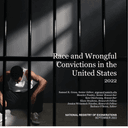
In 2009, Maryland passed legislation that imposed new requirements for prosecutors seeking the death penalty. A recent report presented to the Maryland General Assembly by prominent attorneys, legal experts and law professors analyzes the 2009 law three years after its passage, highlighting its effects on the state’s death penalty system. According to the report, the 2009 law exacerbated a significant set of problems with the state’s death penalty, including its costs, arbitrariness, and impact on murder victims’ survivors. For example, while the requirement of biological or video evidence linking defendants to the murder can reduce the rate of wrongful convictions, the risk of executing an innocent person remains a serious risk. Additionally, Maryland experts believe that the new evidence requirements are likely to increase the punishment’s arbitrary implementation, since the “worst of the worst” defendants may not necessarily be the same people will be eligible for the death penalty under the new requirements. Finally, the 2009 law lengthened the capital trial process, placing additional burdens on murder victims’ families who are involved in the trial and increasing the costs of securing a death sentence. The report concludes, “The amended law cannot even achieve its intent of eliminating the risk of executing an innocent person. The law has also spawned a host of other problems. It has made the application of the death penalty in Maryland more arbitrary and irrational. It has further complicated Maryland’s death penalty system, making it more burdensome for murder victims’ families and more expensive to the state. It has introduced ambiguities into the law that will take years of litigation to sort out.” Read full report here.
(“Maryland’s Death Penalty: Still Here, Still Unfair. More Arbitrary and Costly,” March 2012). Read more Studies on the death penalty.



